|
De Japanse schrijver Abe Kōbō werd geboren op 7 maart 1924 in Tokyo. Zie ook mijn blog van 7 maart 2007 en ook mijn blog van 7 maart 2008 en ook mijn blog van 7 maart 2009 en ook mijn blog van 7 maart 2010.
Uit: The ruined map (Vertaald door E. Dale Saunders)
On the left was a sharp rise with a high protective wall of stone blocks piled on top of each other. On the right was an almost perpendicular cliff, set off from the street by a minimally low guardrail and a ditch. I saw the drawn, pale face of the boy: he came sliding and tumbling down, as if he were holding the guardrail under his arm. My heart leapt thumping to my throat. I started to open the window with the thought of scolding the boy, but I flinched at the reproachful looks which the women cast at me. It would be easier to let him go on by, I supposed. It would be ridiculous if by agitating the women I found myself in the position of having to take responsibility for the boy's bruises. Nothing would jeopardize my situation more than their trumping up some story against me. I had to be without blemish for the present, at least around here.
I stepped on the accelerator. The car barely moved, and there was the smell of burning rubber. Suddenly the curve was there. The colors of the women, clustered around the boy who had missed death with neither loss of blood nor broken bones, flew to the side of my rear-view mirror, and clear sky appeared like the surface of a Braun tube after the picture has disappeared. The stretch of road was flat, and a small bus station lay in a wide space carved out of the hillside. There were benches with roofs to ward off the rain, a public telephone, and even a drinking fountain beside a brick enclosure that perhaps was a flower bed in summer.
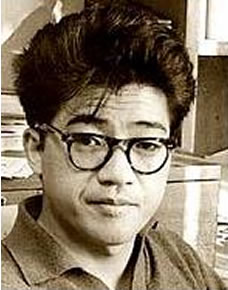
Abe Kōbō (7 maart 1924 22 januari 1993)
De Dominicaanse dichter en schrijver Manuel del Cabral werd geboren op 7 maart 1907 in Santiago de los Caballeros. Zie ook mijn blog van 7 maart 2009 en ook mijn blog van 7 maart 2010.
Tropical Stonecutting
Black men swing down their picks on the white stones.
Within their picks they hold the sun entwined,
And, as if pressed and wrung from them, wept drops
Of patent leather spill out of their spines.
Men with light voices rinsing their dark skin
Rinse it with pearls of stubborn sweat and stand
Cracking the savage cashbox of the wilds,
Cracking the land, but never touching Man.
Leaping from stones, as soon as each pick picks,
A fragment of sheared sun is sparked and blown
Out but resurges with returning picks
Like God himself exploding in the stone.
Enormous yet not great, the morning can
Enter a single drop of sweat and sink.
Struck sparks leap upward from the stones' own skulls
And are the only thoughts the stones can think.
Black men are singing as they swing their axes
As if their song could soften what they break.
But at these stones they delve, and delve forever,
Delving into the quarry of their ache.
Swinging against the innocent light stones,
These Haitians toil out in the noonday rum.
These blacks that bid the cracked stones bristle sparks
Are nights that chip away at chunks of sun.
Today in search of earthen ore, they hit
upon a greater gold: its lode is day,
the very day that took their human picks
and studded them with star-shards, as if they
stood on the summit, hacking God away.
Vertaald door A.Z. Foreman
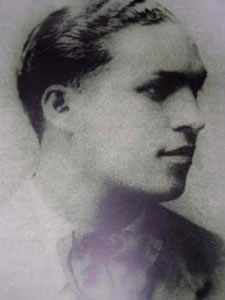
Manuel del Cabral (7 maart 1907 14 mei 1999)
De Nederlandse dichter en schrijver Jan Frederik Helmers werd geboren op 7 maart 1767 in Amsterdam. Zie ook mijn blog van 7 maart 2007 en ook mijn blog van 7 maart 2009 en ook mijn blog van 7 maart 2010.
De Dichter (Fragment)
De feestgalm ruist langs markt en straten
De citer klinkt bij t vreugdgeschal:|
De landman heeft zijn ploeg verlaten:
In sneeuwwit feestgewaad snelt elk naar Romes wal.
De stem de zaamgevloeide menigt
Is tot door vreugd bedwelmd, ontroerd.
Door t trapplend hengstgespan, in t blank gareel geslagen,
Wordt op een zegekar, een jongling omgedragen,
En naar het Kapitool gevoerd.
Ontscheurt gij aan het stof der graven,
ô Tijd! de halve goôn in t licht,
Die eens t heelal de wetten gaven?
Voert gij de Scipios terug voor ons gezigt?
Voor wien is t, dat hier duizend zielen
Als voor een hooger wezen knielen?
Wie is de godheid van deez dag?
Het hoofd des Raads drukt hem een krans van lauwerblaêren,
Terwijl elks lofzang klinkt, op zilverwitte haren,
En huldigt hem met diep ontzag.
Het is Perrarcha, de eer en luister
Van t schoon Itaalje, Phebus zoon:
Hij schopt de onwetendheid in t duister,
En voert de Dichtkunst weêr op delpenbeenen troon.
Juich , Menschdom, juich ! ge ontvangt weêr t leven.
Een Dichter heeft den nacht verdreven
Der domheid, die u eeuwen trof.
Een Dichter doet zijn stem t verbasterd menschdom hooren!
Deugd, wetenschappen, smaak en kunsten zijn herboren;
Zing, aarde! zing des Dichters lof.
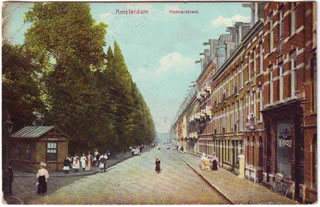
Jan Frederik Helmers (7 maart 1767 26 februari 1813)
Eerste Helmersstraat, Amsterdam, rond 1860
De Duitse schrijver Manfred Gregor (pseudoniem van Gregor Dorfmeister) werd geboren op 7 maart 1929 in Tailfingen.Zie ook mijn blog van 7 maart 2007 en ook mijn blog van 7 maart 2009 en ook mijn blog van 7 maart 2010.
Uit: Die Brücke
Karl Horber hatte sich gerade unter die Dusche im Waschraum gestellt und ließ das eiskalte Wasser über seine mageren Schultern rinnen. Er tat es vorsichtig, so daß der kalte Strahl weder voll auf seine Brust noch voll auf seinen Rücken traf. Entlang der Wand des Kasernenwaschraums und unter der
halboffenen Tür lümmelte der »Verein« herum und verfolgte mit spöttischem Interesse, wie sich Karl Horber den Schmutz herunterspülte, der bei der Übung im Granerfeld an ihm hängengeblieben
war. Der »Verein« hatte seine Freude mit Karl Horber. Man nannte ihn kurz »Zack«, seitdem Horber einen Tag lang als Schanzaufsicht eingeteilt gewesen war und jedes Kommando mit den Begleitworten »aber zackzack« versehen hatte. Horber gehörte selbst zum »Verein« und war wohlgelitten. Mit seinen abstehenden Ohren, dem sommersprossigen Gesicht und dem brandroten Schopf war der Sechzehnjährige an Spott gewöhnt. Auch jetzt, unter der Dusche, zeigte er sich hart im Nehmen, denn der »Verein« sparte nicht mit lehrreichen Hinweisen:
»Mach den Bauch nicht naß, Zack, sonst rostet der auch!«
»Leg die Ohren an, damit der Hals auch was abkriegt!«
»Schade, daß dich dein kleines Mädchen nicht sieht, die könnte sich nämlich nicht satt sehen!«
Jedesmal schallendes Gelächter im »Verein«, und prompt suchte der Nächste eine noch treffendere Bemerkung an den Mann zu bringen. Und Karl Horber lachte mit. Nicht weil das die beste Gegenwehr war, sondern weil Horber so voll Fröhlichkeit steckte, daß er über Witze und Blödeleien einfach
lachen mußte. Auch wenn es Witze über ihn selbst waren.
Horber lachte, und alles an seinem mageren Körper, die schlaksigen langen Beine, der Bauch, der krumme Rücken und die spitzen Schulterblätter, alles schien mitzulachen. Dann stand plötzlich Schaubeck im Türrahmen. Unteroffizier Schaubeck, genannt »das Vieh«.
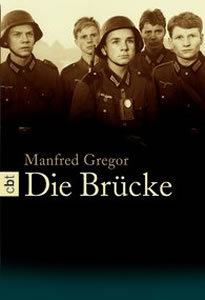
Manfred Gregor (Tailfingen, 7 maart 1929)
Boekomslag
De Italiaanse schrijver Alessandro Francesco Tommaso Manzoni werd geboren op 7 maart 1785 in Milaan.Zie ook mijn blog van 7 maart 2007 en ook mijn blog van 7 maart 2009 en ook mijn blog van 7 maart 2010.
Uit: The Betrothed (Vertaling in de reeks Harvard Classics)
That branch of the Lake of Como, which turns toward the south between two unbroken chains of mountains, presenting to the eye a succession of bays and gulfs, formed by their jutting and retiring ridges, suddenly contracts itself between a headland to the right and an extended sloping bank on the left, and assumes the flow and appearance of a river. The bridge by which the two shores are here united, appears to render the transformation more apparent, and marks the point at which the lake
ceases, and the Adda recommences, to resume, however, the name of _Lake_ where the again receding banks allow the water to expand itself anew into bays and gulfs. The bank, formed by the deposit of three large mountain streams, descends from the bases of two contiguous mountains,
the one called St. Martin, the other by a Lombard name, _Resegone_, from its long line of summits, which in truth give it the appearance of a saw; so that there is no one who would not at first sight, especially viewing it in front, from the ramparts of Milan that face the north, at once distinguish it in all that extensive range from other mountains of less name and more ordinary form. The bank, for a considerable distance, rises with a gentle and continual ascent, then breaks into hills and
hollows, rugged or level land, according to the formation of the mountain rocks, and the action of the floods. Its extreme border, intersected by the mountain torrents, is composed almost entirely of sand and pebbles; the other parts of fields and vineyards, scattered farms, country seats, and villages, with here and there a wood which extends up the mountain side. Lecco, the largest of these villages, and
which gives its name to the district, is situated at no great distance from the bridge, upon the margin of the lake; nay, often, at the rising of the waters, is partly embosomed within the lake itself; a large town
at the present day, and likely soon to become a city.
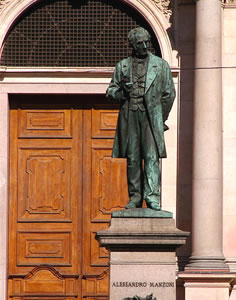
Alessandro Manzoni (7 maart 1785 22 mei 1873)
Standbeeld in Milaan
07-03-2011 om 18:48
geschreven door Romenu 
Tags:Abe Kō,bō,, Manuel del Cabral, Jan Frederik Helmers, Manfred Gregor, Alessandro Manzon, Romenu
|

